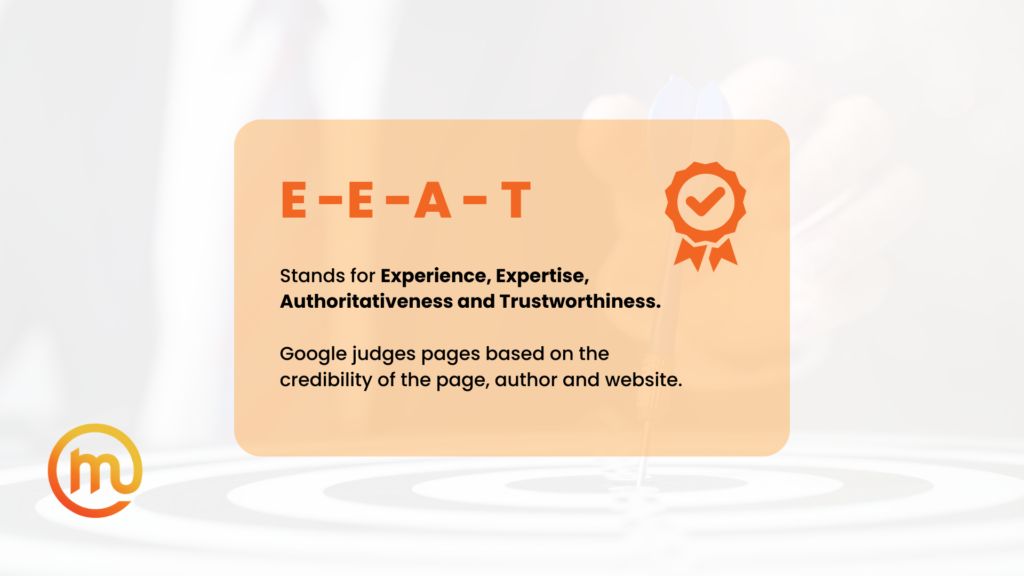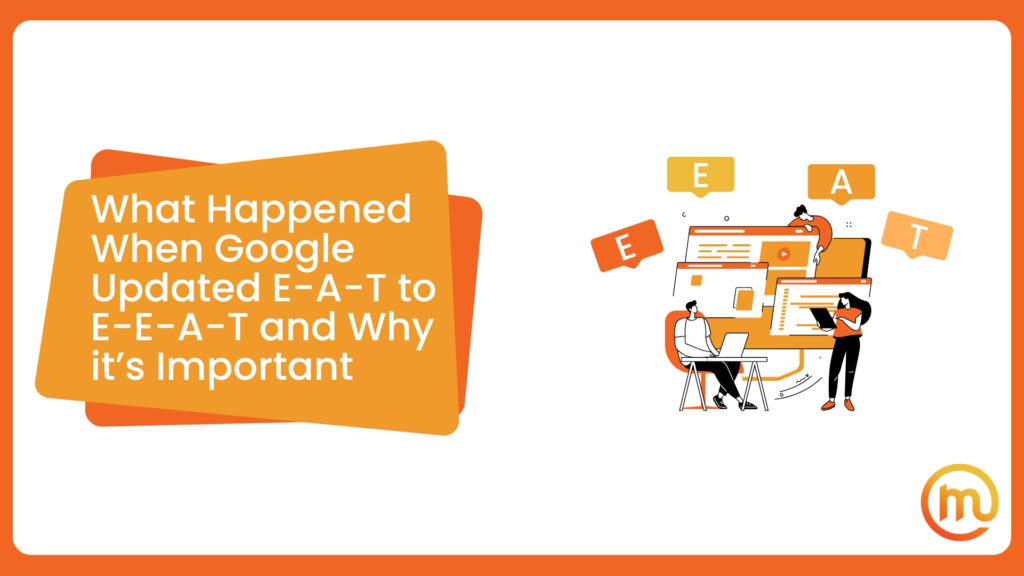For Google Search rankings, proving first-hand experience is more crucial than ever. Until now, Google’s algorithm used the E-A-T concept was used to evaluate whether Google’s search ranking systems were actually providing useful and relevant content. It focused on content that demonstrates expertise, authoritativeness, and trustworthiness. But, the concept has now been updated, and Google has added an extra E to the already familiar E-A-T concept, expanding the concept to include experience.
So what is E-E-A-T and how has E-A-T changed? To find out what is E-E-A-T and how it affects your website, let’s go over the complete E-A-T concept.
What is Google E-A-T?
E-A-T, which stands for “Expertise, Authoritativeness, Trustworthiness,” is a ranking factor that Google uses in its search algorithm. It is intended to help Google identify and surface high-quality, trustworthy content in its search results. The main focus of this concept is to assess the quality of content on pages, including the website’s authoritativeness and trustworthiness. This means that websites must prove to Google that their information is accurate, relevant, and from a knowledgeable source. It works to improve the quality of content on websites, with the goal of providing users with more accurate and reliable information.
Google has stated that E-A-T is particularly important for content that falls into the “Your Money or Your Life” (YMYL) category, which includes pages that could potentially impact a person’s financial stability, health, or safety. Examples of YMYL pages include financial advice websites, medical information websites, and online stores.
To improve the E-A-T of a website or webpage, it is important to establish the website as an authority in its niche by demonstrating expertise, providing high-quality content, and building trust with users. This can be done through factors such as having a clear and transparent about page, citing reliable sources, and obtaining backlinks from reputable websites.
It’s important to note that E-A-T is just one of many factors that Google considers when ranking websites in its search results, which means this is not the only ranking factor that is considered. Google uses a complex and constantly evolving algorithm to determine the ranking of websites, and it is not possible to optimize for all ranking factors.

Expertise
Expertise refers to the knowledge and expertise of the individuals or organizations responsible for creating and publishing content on a website or webpage. Google considers the expertise of the content creators when evaluating the E-A-T of a website or webpage.
To demonstrate expertise, it is important to provide high-quality content that is well-researched, accurate, and informative. This can involve citing sources and linking to reputable sources of information, as well as providing detailed, in-depth information on the topic being covered.
It can also be helpful to include information about the qualifications and experience of the individuals or organizations responsible for creating the content. For example, if you are publishing medical information, it might be helpful to include information about the medical degrees or professional licenses of the authors.
It’s important to note that expertise is just one aspect of E-A-T, and it is important to also focus on establishing authoritativeness and building trust with users in order to improve the E-A-T of a website or webpage.
Authoritativeness
Authoritativeness refers to the perceived authority of a website or webpage on a particular topic. Google considers the authoritativeness of a website or webpage when evaluating the E-A-T of the content.
There are several ways to establish the authoritativeness of a website or webpage:
- Obtain backlinks from reputable websites – Having backlinks from authoritative websites can help demonstrate the authority of your website or webpage.
- Cite reliable sources – Citing reliable sources and linking to them can help establish the authority of your website or webpage on a particular topic.
- Use a clear and professional design – A clear and professional design can help convey the authority of a website or webpage.
- Use clear and concise writing – Clear and concise writing can help establish the authority of a website or webpage, as it shows that the content creators have a strong understanding of the topic they are writing about.
It’s important to note that authoritativeness is just one aspect of E-A-T, and it is important to also focus on demonstrating expertise and building trust with users in order to improve the E-A-T of a website or webpage.
Trustworthiness
Trustworthiness refers to the perceived trustworthiness of a website or webpage. Google considers the trustworthiness of a website or webpage when evaluating the E-A-T of the content. There are several ways to establish the trustworthiness of a website or webpage:
- Use a clear and transparent about page: An about page that clearly explains who is behind the website or webpage can help build trust with users.
- Display contact information: Displaying contact information, such as a phone number or email address, can help build trust with users.
- Use a professional design: A professional design can help convey the trustworthiness of a website or webpage.
- Display third-party trust badges: Displaying third-party trust badges, such as a Verisign seal or a BBB accreditation, can help build trust with users.
- Obtain backlinks from reputable websites: Having backlinks from reputable websites can help demonstrate the trustworthiness of your website or webpage.
It’s important to note that trustworthiness is just one aspect of E-A-T, and it is important to also focus on demonstrating expertise and establishing authoritativeness in order to improve the E-A-T of a website or webpage.
What is Google E-E-A-T Now?
Google’s concept has been updated to E-E-A-T, which now stands for Experience, Expertise, Authoritativeness, and Trustworthiness. Experience has been included to highlight that the level of the content creator’s first-hand knowledge of the subject can also be used to judge the quality of the information. With this reinterpretation of E-E-A-T, Google also emphasizes that “trust” is the “most crucial member of the E-E-A-T family” and is at the core of this idea.

How Does E-E-A-T Affect Your Website?
E-E-A-T does play a key part in metrics that Google uses to assess the quality of websites, even though it is not thought of as a quantitative ranking component. Why is that? Google aims to provide results that are most relevant to users’ search terms. In addition, the aim is to reassure users that the information found on the websites found in their searches is reliable, current, and accurate.
Google delivers results that are useful to its audience since users may use the information provided by these websites to make significant decisions like purchasing a new car, beginning a new diet, or renting an apartment. And because of that, Google prioritizes websites that follow the E-E-A-T best practices and guidelines to avoid delivering websites containing false, damaging, or misleading information. Websites that adhere to these recommendations stand a better chance of being ranked higher in search results than low-quality ones. Websites with poor-quality pages frequently don’t have the right amount of E-E-A-T for their subject or purpose, like the following:
- The author of the content is inexperienced, as evidenced by a restaurant review published by someone who has never dined there.
- If a cookery website offers tax form downloads, for example, it is not an authoritative or reliable source for that information.
- The author of the content lacks the necessary knowledge, as evidenced by the example of a skydiving instruction article authored by a non-skydiver.
- The website or page is unreliable for its intended use, such as a buying page with no information on customer care.
Additionally, Google claims that a good reputation cannot make up for a page’s lack of E-E-A-T for its topic or purpose.
How to Improve Your E-E-A-T score and Website Overall?
Improving your website’s E-A-T score and overall visibility in search engine results is a crucial part of any successful content marketing strategy. By following these best practices, websites can ensure their content is seen as high quality and trustworthy by Google, leading to higher rankings and more customers. This is what any SEO strategy must cover.
It is important to focus on demonstrating expertise, establishing authoritativeness, and building trust with users. This can be done by providing high-quality, well-researched content, citing reliable sources, obtaining backlinks from reputable websites, using a clear and transparent about page, displaying contact information, and using a professional design. It is also important to focus on providing a good user experience, as this can help improve the overall E-A-T score of a website or webpage.

Write Quality Content to Build Trust
The first step to improving your website’s E-E-A-T score is to evaluate your content. To demonstrate expertise, it is important to provide high-quality content that is well-researched, accurate, and informative. The quality of the content on a website is an important factor in determining its E-E-A-T score. Providing well-researched, accurate, and informative content can help demonstrate expertise and establish your website as an authority in its niche.
In order to improve the E-E-A-T of a website, it is important to provide high-quality content that is well-researched, accurate, and informative. This can help demonstrate expertise and establish the website as an authority in its niche. High-quality content can also help build trust with users, which can contribute to the trustworthiness aspect of the E-E-A-T score. With clear and concise writing, you can establish the authority of your website or webpage, as it shows that you have a strong understanding of the topic you are writing about.
In addition to providing high-quality content, it is also important to focus on other factors that can contribute to the E-E-A-T score, such as obtaining backlinks from reputable websites, citing reliable sources, and using a clear and professional design. To establish the authoritativeness of a website, it can be helpful to cite reliable sources and link to them so that they can help establish the authority and trustworthiness of your website. And by getting backlinks from reputable websites can help demonstrate the authority and trustworthiness of your website.

Keep Your Content Fresh
To get a high-quality rating, the content on your website needs to be thorough and pertinent. Therefore, you should continuously assess it and refresh it as necessary to ensure that all of your content is up to date. Every time you update any content on your website, you should show the most current change date.
And instead of trying to cover every interest area in your industry, find the core areas you wish to focus on and start building a robust index of quality information. Placing a website as an authority on a particular subject is more powerful than providing general knowledge about an entire industry. It will be difficult for you to compete with the more niche websites. After choosing your themes, spend some time learning exactly what your target audience is looking for and the purpose of their searches, as this will help you rank higher in search results.

Showcase The Authors
By making it clear who is in charge of the material on a website or webpage, displaying the writers helps foster user trust. This might be particularly crucial for websites or webpages that offer guidance or information on delicate subjects, including financial or medical advice.
The legitimacy and knowledge of the content writers can also be established by displaying the authors of a website or webpage. Users can better comprehend the competence of the people behind the website or webpage by offering information about the authors’ qualifications, experience, and credentials.
Identifying the authors of a website or webpage can not only promote transparency and legitimacy but also foster a sense of community and user interaction. Users may feel more connected to the material and are more likely to trust and interact with it if the people who created the website or webpage are identified by their names and faces.

Make Sure You Have a Good Website Design
An authoritative and trustworthy design can effectively communicate the authority and reliability of your website or webpage. By enhancing the website’s credibility and professionalism, good design can increase its E-A-T (Expertise, Authoritativeness, Trustworthiness) rating. Users might be convinced that a website or webpage is credible and trustworthy and that the content producers are authorities in their industry by looking at its clean, professional design.
By making it simpler for people to browse a website or webpage and get the information they need, smart design can also serve to improve the user experience. This can raise the website’s total E-A-T score and help it become recognized as an authority in its field.
Overall, a good design can enhance the E-A-T of a website or webpage by enhancing the user experience, establishing the website’s reputation and professionalism, and showcasing the content authors’ skills.

Optimize Your Website and Get Made
It’s important to mark that optimization for search engines includes more than just enhancing your website’s E-A-T. It is impossible to optimize for every ranking criteria because Google takes into account a wide variety of other factors when determining the order of websites in its search results. Therefore, rather than attempting to optimize, especially for E-A-T, it is crucial to concentrate on producing high-quality content and providing a positive user experience.

